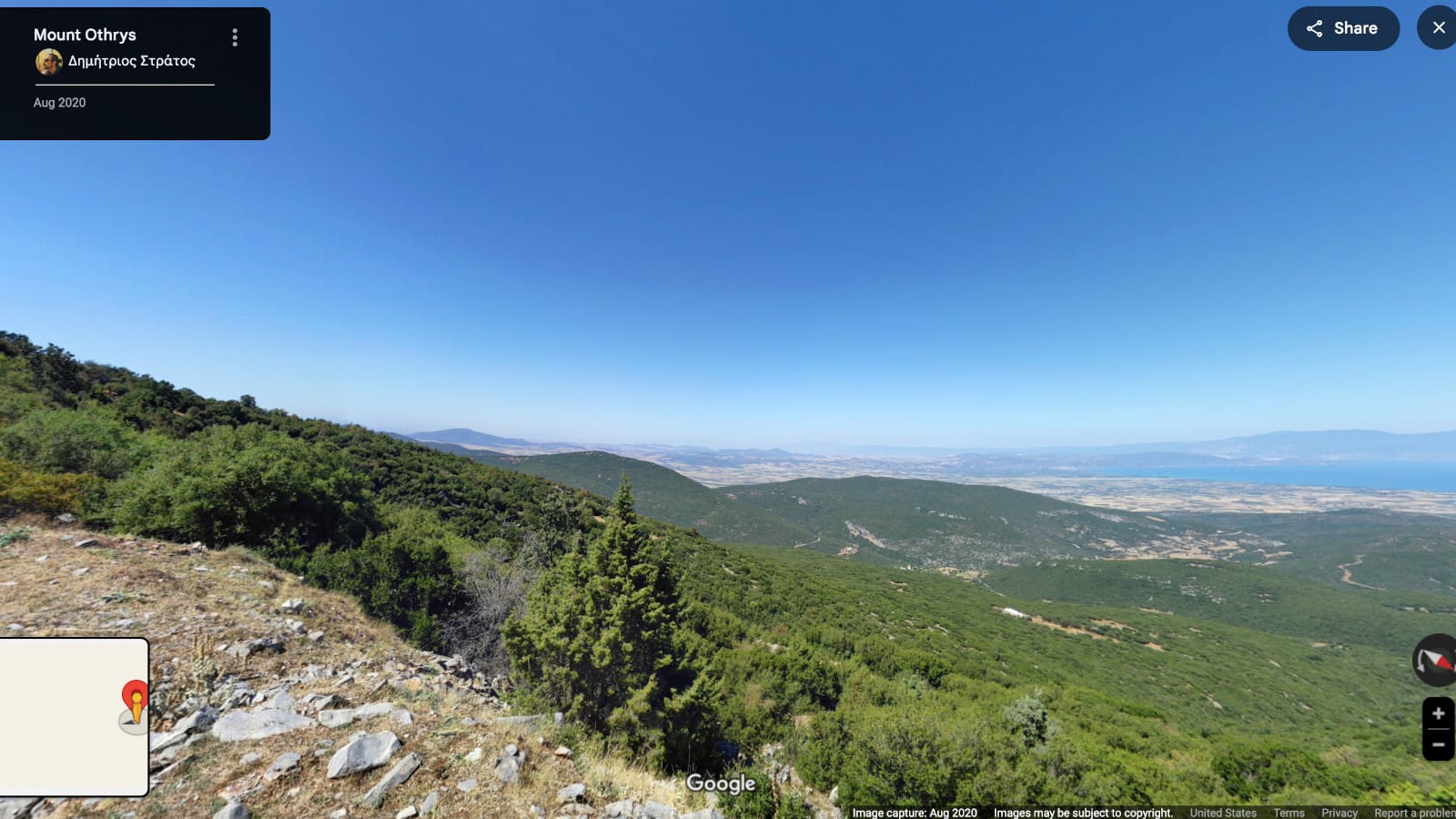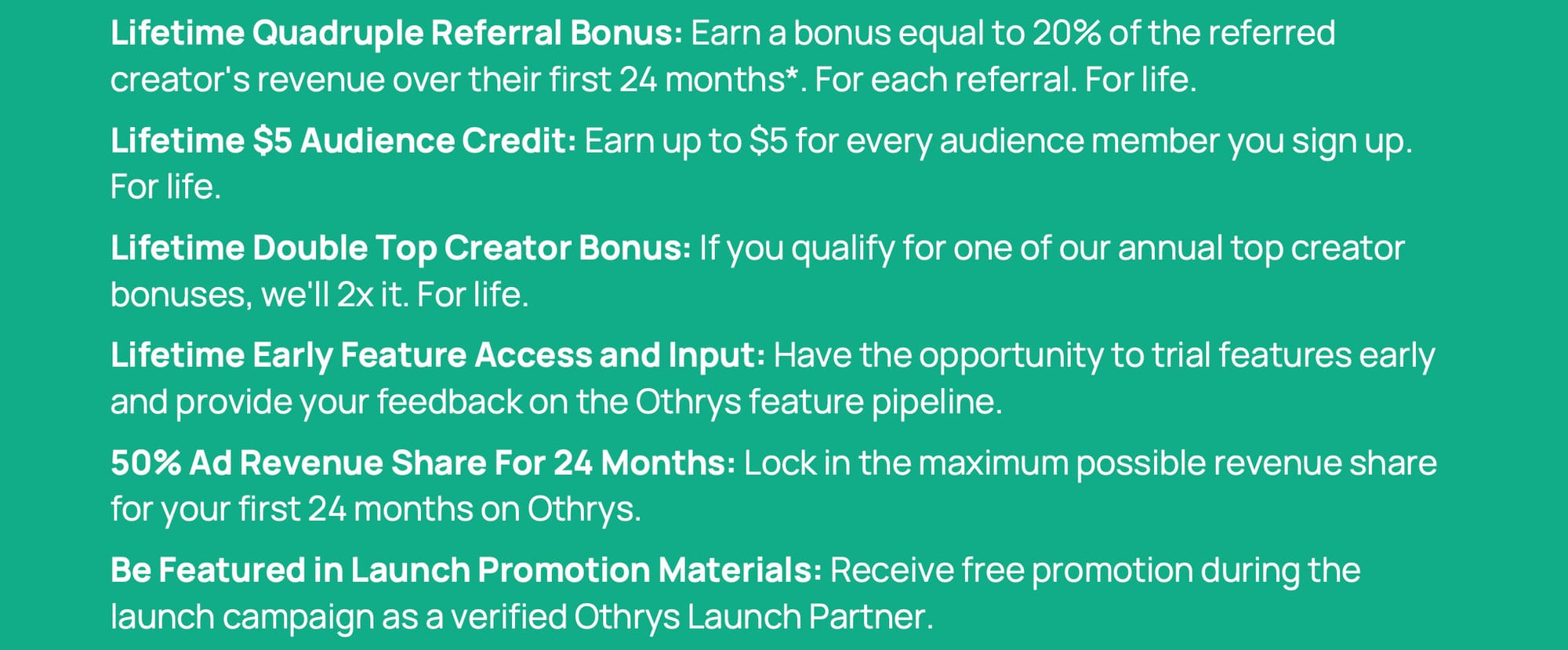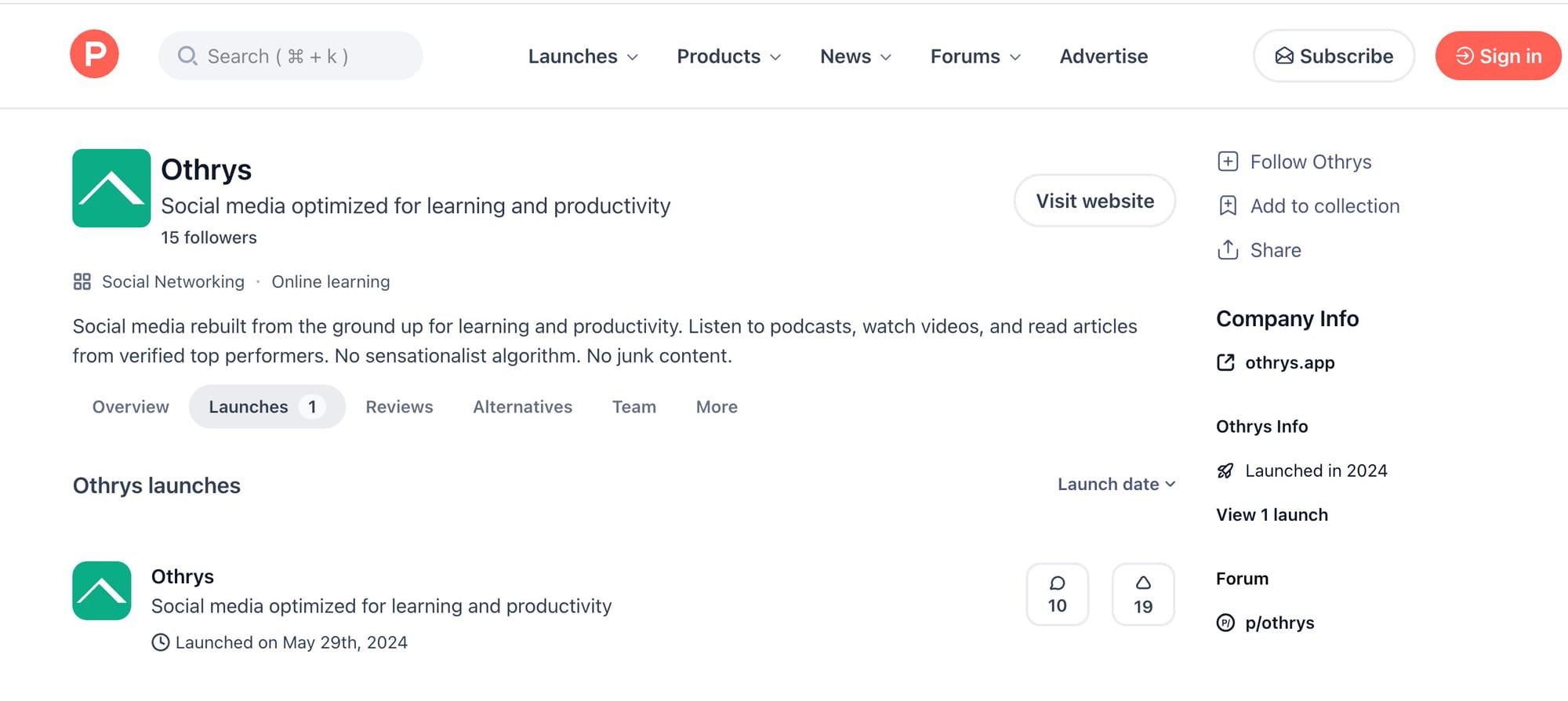The mysterious “Othrys”: My encounter with an unsuccessful social media startup.
Does the world need another social media platform, even a well-intentioned one? We seem to have more than we can handle now.

Note: this article is a little different than my usual fare on the Garden, as it deals not directly with history but with the modern world of tech. I’ve been writing about that a bit more often in 2025 than I did before, and as you may have observed, I have strong opinions, for example, on the epic scam known as “AI.”
About a year ago, in July 2024, I received the following unsolicited email from a total stranger. Let’s just call him Dan. He said:
I stumbled onto your content on YouTube, and was immediately impressed with the level of value you're putting out there. In this climate of algorithms and hot-takes, it's a breath of fresh air when someone with legit real-world success produces genuinely useful, fact-based content. I'm reaching out today because I'm building a platform where your brand of content is the norm, not the exception.
I'm a founder at a new startup called Othrys. The idea is a social media platform completely reimagined for learning and productivity. It can host your videos and your blog, as well as podcasts, images, and microblogs (Twitter, Threads etc). It also has a brand new ad model that makes the platform non-addictive, non-sensational, and fraud-resistant by design (among lots of other things!).
As someone with great credentials who produces truly valuable, insightful content, you are the kind of creator this platform was built for.
I would love to know what you think about the idea. You can check out our website: https://creator.othrys.app/ [Note, link is long dead]
Looking forward to hearing from you.
Let me explain how and why I get emails like this. Being a self-employed historian and fairly minor—though not insignificant—success on YouTube, I get a lot of pitches from various people and companies to get me to buy, join, hire, or promote something or someone. Most are web designers, SEO experts or video editors looking for a job. A few are outright scammers. One thing I’ve learned from my experience is that if you build a train that looks like it’s going in a successful direction, a lot of people are going to show up wanting to ride on it. Less often, but again in not insignificant numbers, I’m pitched by the vanguards of various tech start-ups asking me to join some new organization, usually a brand new social media platform, and/or to share my successful videos on it. For example, I’ve been solicited numerous times by a Chinese network called Ganjing World, which is a front for the Falun Gong cult. Even before I became a success on YouTube, back in 2023, I was solicited—again multiple times—to join something called “Wisdom,” evidently an app intended to compete with Clubhouse, which itself went nowhere. At that time they were recruiting podcasters, and I was known primarily for my show Second Decade.

This “Othrys,” however, was quite mysterious. Its name has associations to classical mythology. Mount Othrys, in Greece, was said in Greek myth to be the birthplace of the major gods, including Zeus and Poseidon, and the base from which they waged war against the Titans. You have to admit, that’s an interesting name for a start-up, which usually have nonsensical names that either sound like malapropisms or are heavy on double vowels. (I’m waiting for someone to name an app “Reek” or “Retch”).
Anyway, Dan pitched hard for my business. The basic idea of Othrys was a little difficult to appreciate at first, but it sounded like his motives were generally pure. I asked a couple of questions and he responded:
Our target audience is people who want to learn from qualified people without the garbage that comes from the existing platforms (addiction, data tracking, fake gurus, fake news, gossip/personal/political content etc). There are so many channels and pages out there dedicated to history that don't come from historians. Some are really good but a lot aren't. On these platforms, there is no filter for who gets to post, and the driver of how many people their posts reach is often how controversial, divisive, emotional it is—not its accuracy, quality and value. Othrys is built to be the solution to those problems.
He directed me to a letter, attached to the email, that explained how Othrys would onboard creators and the extremely complex—dare I say Byzantine—system of how future ad revenue from the app would be shared with them. It was clear that Othrys’s founders, whoever they were (I took Dan at his word that he was one of them), spent a great deal of time on this document, and parsing the details of revenue splits and ad incentives. As is customary with social media startups that don’t have many users yet, or haven’t even launched as was the case here, Othrys hoped to entice me to get members of my audience to join them by promising a bounty of $5 a head for every scalp I brought them. It was a fair bit more complicated than that, but I took that to be the gist of what Dan was offering.

Here was my response.
In theory you have a good idea and I like the ethical aspects of it. You have devised a very exacting model for how Othrys is going to work at scale. What I don’t see is a well thought out plan for how you’re going to grow it to the scale it needs to work.
If the plan is that I recruit my own followers to join Othrys, that’s just not going to work. You use a hypothetical example of having 10,000 people in my audience sign up to spend $5 a month with me. I’m curious how many creators you’re working with who can persuade 10,000 people to do anything, much less sign up for a whole new network, with a new username, a new password, a new app on their phone, more notifications clogging their feeds, etc. That seems wildly optimistic. If I had that sort of remarkable persuasion power I would be convincing those 10,000 people to give me $5 apiece directly via PayPal…It sounds like the time commitment I would be signing up for would primarily be to persuade people to sign up for Othrys. I understand you’re going to pay me $5 a head for everyone I bring in, but there are a lot easier ways for me to earn $5.
Dan responded, saying basically I had made too much of the recruiting strategy (a fair point). His problem, in pitching an unproven social media platform that hadn’t even launched yet, was apparently even more basic than simply not having any users yet. As he put it:
If you joined Othrys and didn’t bring a single member of your audience with you, we would still be extremely happy. The main problem we’re solving for right now is the empty platform problem. On launch, the platform needs to have enough high quality content so that the users we convince to join don’t automatically churn.
I sympathized with the obstacles Dan was facing. It seems to me that launching a brand new social media platform is a technical and commercial task of Herculean proportions. Social media only works when there’s a lot of people who want to join it. The concept of first-generation social media, like Myspace, Facebook and Friendster (remember them?) was, “Hey, join us, all your friends are here.” If it was 2004 and no one was there yet, the ask was more like, “Hey, join us, all your friends will eventually be here.” An outfit like Othrys, or arguably the Clubhouse clone called Wisdom, added another challenge on top of that: “Hey, join us, there’s cool content here.” But what if there’s no content...yet? The ask then becomes, “Hey, join us, there eventually will be cool content here.” Othrys’s founders also apparently thought they’d sell the platform by demonstrating how different it was than algorithm-driven social media.

All well and good, but this poses a problem for me. I hate the term “content creator” because it makes it sound like what I do is fungible, a magical substance that can flow out of a tap whenever I turn the handle. In reality my history videos take weeks to make, reading hundreds of pages, and thorough searches for images, film clips, locations, sources, quotes and other key ingredients. My “Fall of the Monarchies” video, for example, that I made in the fall of 2023, exhausted me so much that a few days after it was finished I threw my back out (in part from sitting in the video editing chair too long) and spent the next couple of days in bed. That video was highly successful, fortunately; but now Dan from Othrys comes along and essentially wants to use that video, and my others, for free (at first), to stock his social media startup with “cool content” that will prevent his first users from churning. Yes, the document he provided explained in great detail how I would be paid for the use of my videos, but later, and only if Othrys eventually became a going concern.
Was I wrong to feel that this was an unfair ask? I put it to Daniel succinctly, saying this:
My historical videos take a huge amount of research and technical work to do. I work 14-hour days for five to six weeks apiece on each one. I understand that you’d like to have the benefit of that hard work help build your platform—work that you have yet to do. That’s fine, but given my work has already been done, I’d rather receive value for it up now, before you begin deriving benefit from it, rather than divvy up pieces of hypothetical revenue down the road which may or may not materialize. Otherwise I’m essentially loaning my material to you on spec without any guarantees of getting paid for it. Given how expensive and labor-intensive these pieces are to create, that model doesn’t make sense for me.
Not willing to slam the door on Dan entirely, I made him an honest counter-offer. Basically, if he wanted me to let him showcase my videos on Othrys, why not just pay me for them up front? I’d be perfectly happy to do this—I even offered to make Othrys-exclusive videos that wouldn’t appear on my YouTube channel—if there was value exchanged now, not months down the road. (Othrys, Dan told me, was scheduled to launch in November 2024).

I suspected that this would be a non-starter, because wherever Othrys’s startup funding came from—venture capitalists, I assumed—I doubted highly that they were actually willing to share a single dime of it with the creators they were courting, instead hoping to entice them to join with promises of some future payday that might never come. It’s easy to promise somebody money in the future in exchange for value you want them to give you today.
I thought it would be a non-starter, and it was. Dan admitted that “our current financial reality doesn’t allow for that at this time,” and then backed off. Though not before asking me if I knew anyone else who might want to join Othrys, and then making one final pitch to try to get me to host the articles that I write here on the Garden, and do not hide behind the paywall or the sign-up barrier (which is not that many), on Othrys. As you recall, this was July, and I told Dan to contact me closer to the launch—perhaps October—and we could discuss the proposition again if by that time he’d managed to attract some more potential users, or other indicators that Othrys would actually fly upon launch.
I never heard from Dan again. Othrys did not launch in November 2024. I was curious if it would, but even at that stage, its projected launch date, the website he’d once directed me to was down, there was no Othrys app on any app store that I could find, no press releases or publicity about a launch (even a delayed or rescheduled one), nothing. Even Dan himself mostly vanished from the internet. He was not on LinkedIn or any other social media platform, at least under the name he used to contact me. All I could find were a few (less than ten) posts he’d made on various forums, back in July, trying to promote Othrys, with few replies and not much interest.

Was I too hard on poor Dan? After all, the basic concept he envisioned for Othrys—a platform of genuine, well-sourced content, not driven by bogus influencers or hijacked by an ad-heavy algorithm—was undoubtedly a good one. Othrys was probably his dream, or someone’s, and its failure, slipping beneath the waves with only a few bubbles, was probably crushing. He seemed like a fine guy to whom I have to give credit for telling it like it was, and not trying to obfuscate anything or evade my admittedly sharp questions with salesman talk. But I can’t help thinking that the proposition just didn’t make any sense in the real world. I mean, think about it. Boiled down to its essence, our exchange was basically like this:
1. Dan: “Hi! Join Othrys! Let me use your videos to promote it and attract users.”
2. Me: “Okay, how much will you pay me to license my videos to you?”
3: Dan: “Nothing today. I’ll pay you Tuesday, after we launch, if I make any money to pay you with.”
4. Me: “It sounds like I’m probably not going to get paid on Tuesday, but you can use the videos if you pay me today.”
5. Dan: “No, I can’t do that, I don’t have any money today.”
6. Me: “Goodbye.”
The fact that Othrys did not, in fact, launch at all can be seen in one sense as validating my suspicions—I certainly would not have gotten paid on Tuesday, as I suspected I would not—but in another sense as, well, I wouldn’t have had much to lose in the long run if I did host my videos on Othrys, given that it foundered instantly, like a ship slipping to the bottom upon its christening. I find it difficult to believe either that I could’ve made any substantive difference to whether Othrys launched or not, or that no other creators Dan might’ve approached would have taken the same tack I did and decided not to do business with him. The project seemed doomed from the get-go.

Indeed, is it even a good idea to try to launch a new social media platform in the year of our Lord 2024 (or 2025)? Most of us are so burnt out on social media, and so resentful of its egregious abuses and manipulations—down to and including fueling a fascist takeover of the United States—that the very idea of joining a new social media platform is eyeroll-inducing for many people. Dan should have launched Othrys ten years ago; he might’ve made something of it. I also wonder what venture capitalists put money down on the Othrys startup hoping to get a return. Maybe none; perhaps it was Dan alone or a small circle of like-minded friends behind the venture. I’ll never know. I thought of trying to contact Dan to find out what happened to Othrys, but he has proven to be as much of a phantom as the company he tried to found.
It’s a shame that our tech industry, bereft and bankrupt as it is of ideas (except the fulsome fiction of “AI”), is so stacked against people like Dan. As much as I hate it, I’m a cog in this wheel no less than anyone else is. We need a fundamental realignment of how technology works, the marketplace, and the internet in general. I doubt many people will remember Othrys—it’s clear almost no one ever heard of it—but it’s worth considering why it didn’t work. The Othrys episode remains one of the more curious episodes from my bizarre career as a public historian. I thought I’d share it with you, for whatever it’s worth.
The Value Proposition
Why should you be reading this blog, or receiving it as a newsletter? This is why.
☕ If you appreciate what I do, buy me a virtual coffee from time-to-time to support my work. I know it seems small, but it truly helps.
📖 You could also buy my newest book.
🎓 Like learning? Find out what courses I’m currently offering at my website.
📽 More the visual type? Here is my YouTube channel with tons of free history videos.



Comments ()